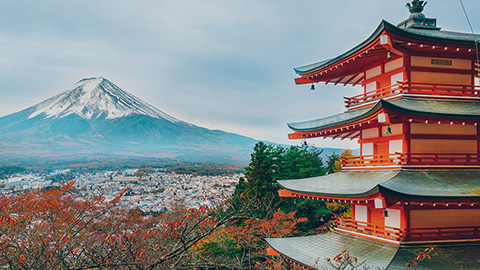February 2024
IKEA’s Model for Success in Japan Through Cultural Understanding
Petra Färe
President / CEO & CSO
IKEA Japan K.K
March 2024

Petra Färe was appointed IKEA Japan's CEO and CSO (Chief Sustainability Officer) in 2021, and she's relishing every moment of building the world-famous brand's presence in Japan. With over 24 years of experience working for IKEA, she has a deep understanding of how the Swedish brand inspires tasteful design through affordable products intimately connected to people's lives. This gives her valuable takeaways for other companies looking to do business in Japan, too.
We spoke with Färe about the history of IKEA's development in Japan, including the newest location in Maebashi, Gunma Prefecture — a place that has a unique connection to the sustainable initiatives at the core of IKEA's vision and values. Through her understanding of the Japanese consumer mindset, we learned about the possible challenges as well as key factors for success in Japanese market entry, and untapped potential in Japan built on IKEA's vision of sustainable business expansion.
Beyond a Buzzword — "Sustainable" Retail in Concrete Terms
IKEA's 10th Japanese retail store in Maebashi, Gunma Prefecture is a "culmination of everything we have learned over the years when it comes to sustainable operations," states Färe. This includes solar panels for renewable energy, minimizing water use, the sale of products that had been displayed or once purchased by customers, and more. Further, the location is accessible via public transport, allowing IKEA to flourish alongside local residents.

IKEA Maebashi, the 10th Store in Japan
The word "sustainability" is everywhere in the Japanese media, and word-of-mouth philosophies like the phrase mottainai — conveying regret over all forms of waste — indicate a collective social consciousness regarding the issue. An important next step is continuing to offer consumers choices that genuinely and positively impact our global environment.
One example IKEA has fostered in this regard is common-sense delivery of packages in a more practical time frame, rather than the quickest possible option. "Given the recent global logistics crisis, fulfilling deliveries that support a healthy shipping network, including EV trucks, is one way we are directly contributing to sustainability in Japan," explains Färe.

IKEA's EV trucks aim to achieve 100% zero emissions
"Japan is a resource-dependent country, just like Sweden." To this end, while Japanese consumer expectations are high, the reality of global environmental and local economic factors will require dramatic change in the near future. "When people become aware and decide collectively to make positive change, Japan will become a world-leading, leapfrogging society in terms of sustainability," Färe believes.
Learning from Experience in Successful Japanese Market Entry
As a global home furnishing giant, IKEA has learned that "we have to understand the market, understand people and their daily lives," says Färe. This includes offering relevant home furnishing solutions for a broad demographic of consumers, because "better homes create better lives," she adds.
Färe continues, "Seasonality — the meaningful and subtle differences between spring, summer, autumn and winter — and close attention to dietary habits and culinary tradition are very important to Japanese society." Providing products that improve peoples' well-being is crucial to success in Japan. In efforts to understand how IKEA has made this possible, she details, "We focus on consumer research. We visit people's homes in order to understand how we can contribute to their livelihoods and publish our annual Life at Home Report."
Adapting to Understand Japanese Consumer Expectations
4-1 Japanese consumers are well known for having high standards. Färe notes, "There's a need to respect people's time, and their money — it's important to be affordable, and people expect convenience. Although in Japan, self-service is also highly accepted in retail environments." In Japan, the convenience of electronic money and self-service checkout registers are only the tip of the iceberg, and consumers are constantly adapting to new innovations that influence their decisions. Färe adds, "Consumer behavior today is not strictly physical or digital. It's merged." This means that companies must adapt accordingly.

Adapting to Japanese consumers' expectations in product development is essential
For IKEA this entails further market research into shopping habits, with a distinct focus on listening to their customers. "I would encourage any company coming to Japan to lend not only their ears and eyes, but to really side with people. Not coming here to decide what they need but put themselves in their shoes and find out what they really need," Färe says.
Any company considering entry into Japan, whether in the retail sector or otherwise, should undertake a detailed market research and analysis program that takes cultural and social factors seriously. IKEA has succeeded in this regard, and other companies should focus on truly understanding Japan first, and then building meaningful connections with people and communities. Through IKEA's leading example of "healthy, sustainable, affordable living for everyone," the sky is the limit for new businesses to find success in Japan.
Learn More
Contact Us
Investing in Japan
We will do our very best to support your business expansion into and within Japan. Please feel free to contact us via the form below for any inquiries.
Inquiry FormJETRO Worldwide
Our network covers over 50 countries worldwide. You can contact us at one of our local offices near you for consultation.
Worldwide Offices




























